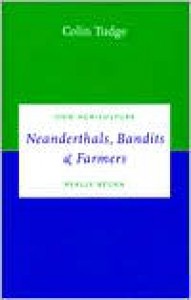 This is a short monograph (50 pages) that synopsizes Colin Tudge's argument that pre-Neolithic Revolution humans (and, indeed, hominids in general) have been modifying their environment for hundreds of millennia, and this includes "farming," of which Tudge identifies three types:
This is a short monograph (50 pages) that synopsizes Colin Tudge's argument that pre-Neolithic Revolution humans (and, indeed, hominids in general) have been modifying their environment for hundreds of millennia, and this includes "farming," of which Tudge identifies three types:1. Horticulture: Or, more prosaically, "gardening."
2. Arable farming: The stereotypical image of the wheat or rice farmer toiling in a field.
3. Pastoral farming: Which mixes arable and/or horticultural farming with stock raising.
Arable farming is not the unmitigated blessing that mythology makes it out to be - it involves backbreaking labor, leads to malnutrition because it narrows the varieties of food in the diet, and it increases disease amongst both human and domesticated animal populations. Despite these, the advantages of increased population, an ensured food supply and greater return on investment made arablist cultures more successful than horticulturalists or pastoralists.
The last point about the return on investment refers to the fact that a hunter can invest ten hours or two to hunting and, in the long run, won't get any more food out of it. That's why predator species and hunter/gatherers look like no-good layabouts - there's no percentage in exerting themselves. Arablists, on the other hand, do get more for more effort. Their food supply increases when more labor is expended in its production.
Tudge characterizes arable farming as a vicious circle: Greater food supply means a greater population that can only be sustained with further arable farming. Once embarked on the arablist path, a culture is locked in - it can't affort to go back to the Edenic existence of its past. (Tudge makes this explicit with reference to the Cain/Abel myth in Genesis, where Cain - the arablist - murders Abel - the pastoralist - and is cursed. Further, God casts Adam and Eve out of Eden to specifically farm:
Cursed is the ground for your sake;
In toil you shall eat of it
All the days of your life....
In the sweat of your face you shall eat bread
Till you return to the ground.... (Genesis 3:17-19, NKJV))
Tudge also ties proto-(arable) farming to the Pleistocene overkill, when large numbers of megafauna genera went extinct around the same time humans moved into the vicinity, and to the end of the Neanderthal, who simply couldn't adjust to the more efficient use of the environment modern humans were capable of.
As to the "why" of arable farming, Tudge believes the catalyst was climate change. With the end of the last Ice Age, food supplies were threatened in the Middle East and previously periodic arable farming became the norm, locking cultures into the arablist cycle and allowing the development of urban cultures like Sumer, Mohenjo-Daro and Shang China.
In 50 pages, of course, none of these propositions can be adequately argued but Tudge and others have written numerous works on the subject. A few recommendations from my own reading would include:
Tudge's own The Time Before History: 5 Million Years of Human Impact
Charles Mann's 1491: New Revelations of the Americas Before Columbus
Ian Wilson's Before the Flood: The Biblical Flood as a Real Event and How It Changed the Course of Civilization
Steve Mithen's After the Ice: A Global Human History 20 000-5000 BC
Among many others.


